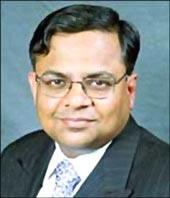 The Indian information technology industry will need to move up the value chain to tackle competition from countries like China, Philippines and Vietnam, said Ratan Tata.
The Indian information technology industry will need to move up the value chain to tackle competition from countries like China, Philippines and Vietnam, said Ratan Tata.
The Tata Consultancy Services chairman was addressing the 15th annual general meeting of the company.
"India's space in the IT sector will be challenged by other countries. That would, in turn, impact margins of the company as well as others. However, TCS has made the greatest stride in moving up the value chain in the last few years," said Tata.
With 8 per cent revenue growth in FY 2010 and a jump of 33 per cent in net profits, Tata said the company has moved up the value-chain by focusing on being an end-to-end solutions provider, adding services like business process outsourcing and working closer with business partners.
Talking on the global economy, N Chandrasekaran, chief executive officer and managing director of TCS said while the global economy is recovering, "recovery in Europe is slower than the US."
"As for the results last year, the slowdown and the crisis affected the Euro growth. We also had a couple of clients who had issues. To add to it, the currency fluctuation has brought down the share of Europe's revenue from 30 to 20 per cent. However, the currency is now stabilising. From an economy point of view, we have not seen any major significant impact," said Chandrasekaran.
When asked whether the UK government has communicated anything on the deals signed by the company, he said: "We are waiting and watching. But so far we have not seen any impact."
Recently the company has come under attack from the newly-elected Conservative Party on the deals that were awarded to it by a few departments.
Meanwhile, when shareholders at the AGM asked Tata about the high salary compensations to the top management in the company, he said: "Our executives need to be adequately compensated. Besides, they do not have stock options as other companies give to their management."
Senior executives in the company saw their salary grow between 20 and 55 per cent.
Shareholders also insisted that Tata should continue to be on the board and the company should do away with the age limit for non-executive board members. However, Tata explained that it would not be possible.
"All of us are human and we must move on and give others a chance," he said.
The Tata Goup has stipulated that non-executive board members would retire by the age of 75 and executive directors and CEOs will retire at 65 years.
On when the company would be able to complete the ePassport project, Tata said: "It is a fairly large and complex project. But it is on course. Four centres have already been set up and 73 more would be in place."
TCS gave a total dividend of Rs 20 per share during the fiscal. "Yes it is a high payout ratio. But we had cash and we had no plans for acquisition. So we thought of returning the money to the shareholders," said Tata, when one of the shareholder asked why has the company given a high payout.












 © 2025
© 2025